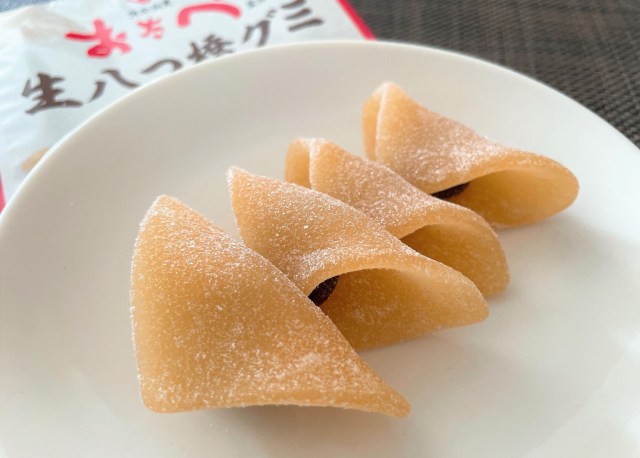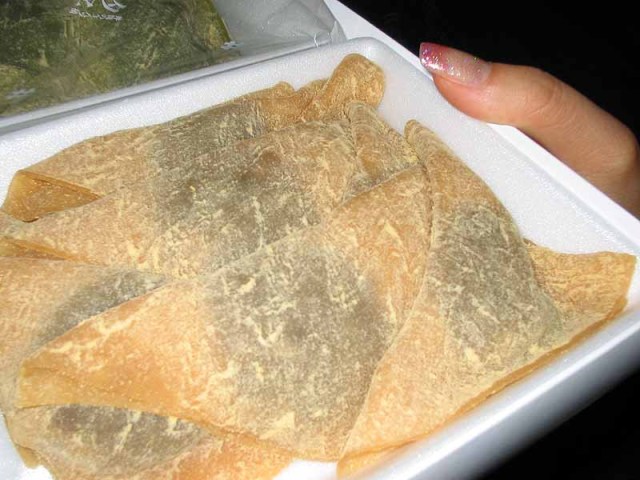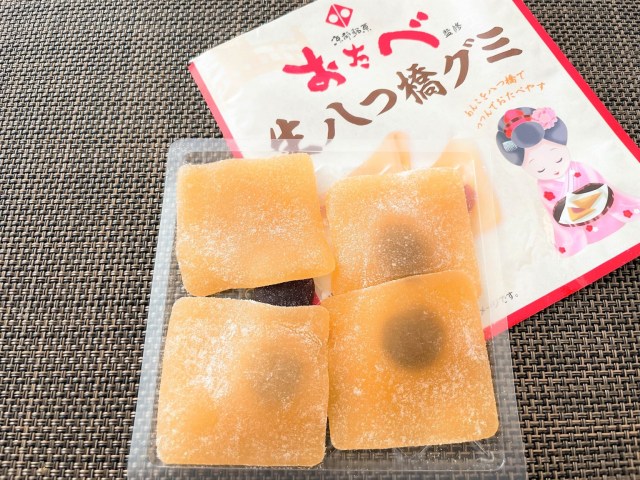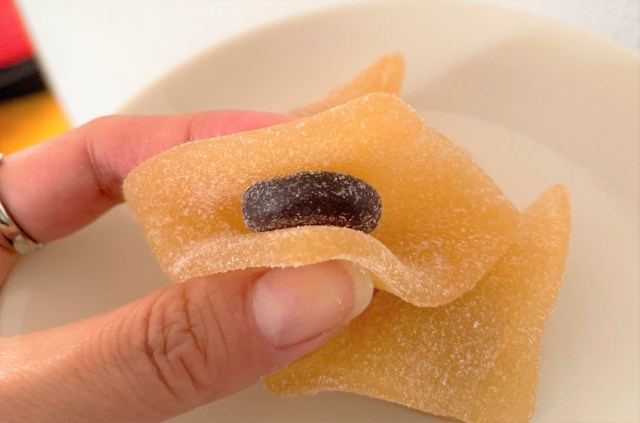
Want to get your yatsuhashi fix but live too far away from Kyoto? We’ve got the answer for you!
For fans of Japanese confectionary, there’s no place better to get your fix than the former capital city of Kyoto. Whether you’re looking for Japan’s oldest sweet or something modern yet elegant, you need look no further than Kyoto.
One of Kyoto’s most famous sweets are yatsuhashi, a triangular Japanese sweet made from glutinous rice flour, sugar and often cinnamon. There are three kinds of yatsuhashi, but arguably the most popular variety is the unbaked version with a red bean filling, called ‘nama yatsuhashi’.
▼ Nama yatsuhashi is a popular souvenir to bring back from Kyoto and comes in boxes like this.
Our Kansai-based Japanese language reporter K. Masami is lucky enough to be able to enjoy a delicious yatsuhashi whenever she wants, but for those of us who live far away from Kyoto, we have to rely on travelling friends and co-workers to bring us back some sweet treats.
However, upon a recent visit to her local drugstore, Masami came across something that changes everything — yatsuhashi gummy candies.
▼ The yatsuhashi gummies are made by famous Kyoto-based confectionary company Otabe
The gummy candies cost 214 yen (US$1.89) for a packet of four, compared to the price of Otabe’s regular nama yatsuhashi, costing 594 yen (US$5.23) for a pack of ten.
At a glance, you could definitely mistake these for actual nama yatsuhashi; the red bean filling was visible from the outside, and the texture and colour looked very similar to that of real nama yatsuhashi.
As Masami picked up one of the yatsuhashi, she noticed the ‘red bean paste’ wasn’t actually inside the sweet like expected, but underneath, meaning she’d have to add the filling and fold the outside herself. Masami is already well versed in the art of making traditional Japanese sweets, so assembling this yatsuhashi was but a walk in the park. Still, she’d always wanted to be able to add “can make yatsuhashi sweets” to her resume, and this was a novel way of doing it.
▼ Turns out it’s not actually that hard to do.
As Masami folded the outer layer of the yatsuhashi, she was immediately reminded that she was dealing with gummy candy and not real yatsuhashi, as the outer layer sprang back to its original square shape. The sugary coating kept making Masami’s fingers fairly sticky, but despite all of that she was having fun making her own traditional Kyoto sweets, albeit in a gummy form.
But presentation wasn’t Masami’s biggest concern; it was time for the taste test. How did it compare to real nama yatsuhashi?
Well, it certainly tasted similar, but there was a huge difference in the texture, and the chewy candy wasn’t as soft as real yatsuhashi. The flavour of cinnamon and red bean paste really shone through though, and if her tongue were to suddenly stop working, they would probably be indistinguishable from real nama yatsuhashi.
An added bonus to the gummy candy yatsuhashi is its long shelf life; the candies Masami bought weren’t set to expire for another six months, giving her plenty of time to get her Kyoto candy fill.
▼ Or you can just eat them all in one go, Masami. We promise we won’t judge.
Otabe’s Nama Yatsuhashi Gummies can be found throughout Japan in drugstores and supermarkets, so if you’re looking for a fun way to enjoy some traditional Japanese sweets, or are just craving yatsuhashi but live too far away, Masami recommends giving this gummy version a try.
Whether you share them with your co-workers, hold a yatsuhashi party and make them with friends, or just keep them all to yourself, you’re sure to have a good time with these. Of course for some, nothing quite beats the real thing, especially when they look as cute as these maiko yatsuhashi from Kyoto.
Photos ©SoraNews24 unless otherwise mentioned
● Want to hear about SoraNews24’s latest articles as soon as they’re published? Follow us on Facebook and Twitter!
[ Read in Japanese ]

 Image:
Image: 



 If you cook Kyoto’s famous chewy “raw” confectionary, will it become a rice cracker?【SoraKitchen】
If you cook Kyoto’s famous chewy “raw” confectionary, will it become a rice cracker?【SoraKitchen】 Kyoto’s most popular local sweets get a soft spin with Fuwafuwa Otabe【Taste test】
Kyoto’s most popular local sweets get a soft spin with Fuwafuwa Otabe【Taste test】 How to make Kyoto’s most famous dessert, nama yatsuhashi, with your microwave
How to make Kyoto’s most famous dessert, nama yatsuhashi, with your microwave Pikachu and Kyoto candy maker team up for confectionary collaboration centuries in the making
Pikachu and Kyoto candy maker team up for confectionary collaboration centuries in the making We tried 12 different gummy candies from a Japanese supermarket and found the most delicious one
We tried 12 different gummy candies from a Japanese supermarket and found the most delicious one Japan Extreme Budget Travel! A trip from Tokyo to Izumo for just 30,000 yen [Part 1]
Japan Extreme Budget Travel! A trip from Tokyo to Izumo for just 30,000 yen [Part 1] Foreign tourists in Japan will get free Shinkansen tickets to promote regional tourism
Foreign tourists in Japan will get free Shinkansen tickets to promote regional tourism Japan just had its first same-month foreign tourist decrease in four years
Japan just had its first same-month foreign tourist decrease in four years Crane games in Japanese convenience stores getting more and more popular, especially with tourists
Crane games in Japanese convenience stores getting more and more popular, especially with tourists Face-mask-themed park “Tokyo Mask Land” opens in Japan
Face-mask-themed park “Tokyo Mask Land” opens in Japan Saitama is home to the best strawberries in Japan that you’ve probably never even heard of
Saitama is home to the best strawberries in Japan that you’ve probably never even heard of Majority of Japanese women in survey regret marrying their husband, but that’s only half the story
Majority of Japanese women in survey regret marrying their husband, but that’s only half the story A look inside the “Ghost Tower” of Bangkok, Thailand’s abandoned skyscraper
A look inside the “Ghost Tower” of Bangkok, Thailand’s abandoned skyscraper All-you-can-eat ice cream unleashed on Japan by Cold Stone
All-you-can-eat ice cream unleashed on Japan by Cold Stone You can now visit a recreation of Evangelion’s Tokyo-3 and live there in miniature form in【Pics】
You can now visit a recreation of Evangelion’s Tokyo-3 and live there in miniature form in【Pics】 The 10 most annoying things foreign tourists do on Japanese trains, according to locals
The 10 most annoying things foreign tourists do on Japanese trains, according to locals Starbucks Japan releases new sakura goods and drinkware for cherry blossom season 2026
Starbucks Japan releases new sakura goods and drinkware for cherry blossom season 2026 Is Sapporio’s Snow Festival awesome enough to be worth visiting even if you hate the snow? [Pics]
Is Sapporio’s Snow Festival awesome enough to be worth visiting even if you hate the snow? [Pics] Japan has trams that say “sorry” while they ride around town…but why?
Japan has trams that say “sorry” while they ride around town…but why? Tokyo Skytree turns pink for the cherry blossom season
Tokyo Skytree turns pink for the cherry blossom season Highest Starbucks in Japan set to open this spring in the Tokyo sky
Highest Starbucks in Japan set to open this spring in the Tokyo sky Japan’s new “Cunte” contact lenses aren’t pronounced like you’re probably thinking they are
Japan’s new “Cunte” contact lenses aren’t pronounced like you’re probably thinking they are Shibuya Station’s Hachiko Gate and Yamanote Line stairway locations change next month
Shibuya Station’s Hachiko Gate and Yamanote Line stairway locations change next month Yakuzen ramen restaurant in Tokyo is very different to a yakuza ramen restaurant
Yakuzen ramen restaurant in Tokyo is very different to a yakuza ramen restaurant Starbucks Japan adds new sakura Frappuccino and cherry blossom drinks to the menu
Starbucks Japan adds new sakura Frappuccino and cherry blossom drinks to the menu Japan’s newest Shinkansen has no seats…or passengers [Video]
Japan’s newest Shinkansen has no seats…or passengers [Video] Foreigners accounting for over 80 percent of off-course skiers needing rescue in Japan’s Hokkaido
Foreigners accounting for over 80 percent of off-course skiers needing rescue in Japan’s Hokkaido Super-salty pizza sends six kids to the hospital in Japan, linguistics blamed
Super-salty pizza sends six kids to the hospital in Japan, linguistics blamed Starbucks Japan unveils new sakura Frappuccino for cherry blossom season 2026
Starbucks Japan unveils new sakura Frappuccino for cherry blossom season 2026 Take a trip to Japan’s Dododo Land, the most irritating place on Earth
Take a trip to Japan’s Dododo Land, the most irritating place on Earth Naruto and Converse team up for new line of shinobi sneakers[Photos]
Naruto and Converse team up for new line of shinobi sneakers[Photos] Is China’s don’t-go-to-Japan warning affecting the lines at a popular Tokyo gyukatsu restaurant?
Is China’s don’t-go-to-Japan warning affecting the lines at a popular Tokyo gyukatsu restaurant? Survey asks foreign tourists what bothered them in Japan, more than half gave same answer
Survey asks foreign tourists what bothered them in Japan, more than half gave same answer Japan’s human washing machines will go on sale to general public, demos to be held in Tokyo
Japan’s human washing machines will go on sale to general public, demos to be held in Tokyo Starbucks Japan releases new drinkware and goods for Valentine’s Day
Starbucks Japan releases new drinkware and goods for Valentine’s Day We deeply regret going into this tunnel on our walk in the mountains of Japan
We deeply regret going into this tunnel on our walk in the mountains of Japan Studio Ghibli releases Kodama forest spirits from Princess Mononoke to light up your home
Studio Ghibli releases Kodama forest spirits from Princess Mononoke to light up your home Major Japanese hotel chain says reservations via overseas booking sites may not be valid
Major Japanese hotel chain says reservations via overseas booking sites may not be valid Put sesame oil in your coffee? Japanese maker says it’s the best way to start your day【Taste test】
Put sesame oil in your coffee? Japanese maker says it’s the best way to start your day【Taste test】 No more using real katana for tourism activities, Japan’s National Police Agency says
No more using real katana for tourism activities, Japan’s National Police Agency says Kyoto geisha and maiko yatsuhashi sweets are the latest food craze to hit the ancient capital
Kyoto geisha and maiko yatsuhashi sweets are the latest food craze to hit the ancient capital Magic gummy candies become a viral hit on social media
Magic gummy candies become a viral hit on social media Mos Burger releases new gummi candies in Japan
Mos Burger releases new gummi candies in Japan Dragon Quest’s Slime is now a geisha (and delicious)
Dragon Quest’s Slime is now a geisha (and delicious) Supermarket souvenirs! You can buy a bunch of presents in Kyoto while ignoring tourist shops
Supermarket souvenirs! You can buy a bunch of presents in Kyoto while ignoring tourist shops Sweet omelette-flavored gummies? Famous Japanese YouTuber tries it so you don’t have to!
Sweet omelette-flavored gummies? Famous Japanese YouTuber tries it so you don’t have to! Perfect Japanese summer day: Chilled desserts served in a Kyoto manor house
Perfect Japanese summer day: Chilled desserts served in a Kyoto manor house We try some “raw” dorayaki from Kyoto and are overwhelmed with its thickness
We try some “raw” dorayaki from Kyoto and are overwhelmed with its thickness We eat Japan’s oldest sweet, available at only one store in all of Japan
We eat Japan’s oldest sweet, available at only one store in all of Japan Kyoto’s famous Chinese dish karashi soba can now be found in Lawson
Kyoto’s famous Chinese dish karashi soba can now be found in Lawson 7-Eleven Japan’s most popular product with foreign tourists is…a unique chocolate gummy
7-Eleven Japan’s most popular product with foreign tourists is…a unique chocolate gummy Starbucks Japan’s sakura Frappuccino and latte make us see the cherry blossoms in a new light
Starbucks Japan’s sakura Frappuccino and latte make us see the cherry blossoms in a new light ‘Butter mochi’ flavoured chocolate may be the best kind of Tirol we’ve ever tasted
‘Butter mochi’ flavoured chocolate may be the best kind of Tirol we’ve ever tasted Starbucks Japan’s final sakura Frappuccino for 2022 gives us a new cherry blossom flavour
Starbucks Japan’s final sakura Frappuccino for 2022 gives us a new cherry blossom flavour Krispy Kreme teams up with famous Japanese snack and candy maker for unique donuts and drink
Krispy Kreme teams up with famous Japanese snack and candy maker for unique donuts and drink Kyoto cotton candy brings us the taste of a traditional Japanese festival
Kyoto cotton candy brings us the taste of a traditional Japanese festival